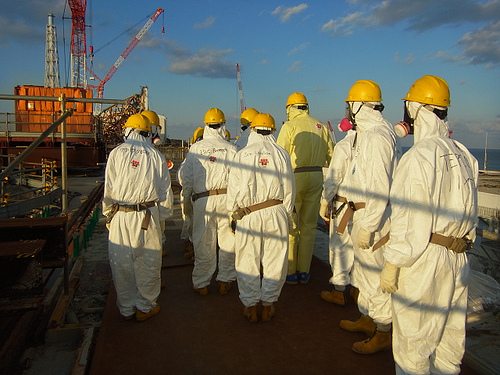

Energy
Fukushima nuclear disaster inflicted ‘serious biological effects’ on wildlife
An investigation into the impacts of the 2011 Fukushima Daiichi nuclear disaster has found that radiation may be harming wildlife in the area.
In a series of new studies, published this week in the Journal of Heredity, scientists found evidence of population declines and genetic damage in species around Fukushima, Japan.
“A growing body of empirical results from studies of birds, monkeys, butterflies, and other insects suggests that some species have been significantly impacted by the radioactive releases related to the Fukushima disaster,” said Timothy Mousseau of the University of South Carolina, lead author of one of the studies.
One study focussed on the population of the pale grass blue butterfly. It found the butterflies were smaller and grew slower, while many also died as a result of radiation exposure. Some butterflies were grown in a laboratory from parents collected from Fukushima, and displayed the same symptoms.
Barn swallows have also been found to develop unusual white feathers – a trend also discovered by studies of the area surrounding the 1986 Chernobyl nuclear disaster in Ukraine.
Overall, the numbers of many species of birds, butterflies and cicadas were found to have fallen significantly.
This follows a separate study, published in July, which found blood defects in monkeys living near the disaster zone.
The researchers note that while scientists were denied entry to the still-abandoned city of Chernobyl until some time after the 1986 disaster, investigators began gathering biological samples within months of the Fukushima leak.
This, they say, has provided an important baseline for future research on the effects of radiation on the environment.
“Detailed analyses of genetic impacts to natural populations could provide the information needed to predict recovery times for wild communities at Fukushima as well as any sites of future nuclear accidents,” Mousseau added.
“There is an urgent need for greater investment in basic scientific research of the wild animals and plants of Fukushima.”
The 2011 incident occurred after an earthquake and subsequent tsunami sparked the meltdown of three reactors at the Fukushima Daiichi plant.
In the wake of disaster, operations at all 48 of Japan’s nuclear power plants were quickly halted. Three years on, they have yet to be restarted.
Many environmentalists continue to lobby against nuclear power, because of the risks associated with radiation leaks. Others insist it is an essential fuel source, and warn that the most devastating impacts of climate change cannot be avoided without it.
Blue & Green Tomorrow’s Sustainable September Energy Debate, which will take place at Siemens Crystal in London on September 16, will examine this issue.
Four leading names from the UK energy sector will debate either for or against the motion, “Gas and nuclear power will address carbon emissions in the immediate term, far more effectively than renewables”. Tickets are available here.
Photo: Nuclear Regulatory Commission via Flickr
Further reading:
Blood defects in Japanese monkey linked to Fukushima nuclear disaster
Doubts surround effectiveness of Fukushima Ice Wall
Thyroid cancer cases rise among Fukushima children – but link to nuclear disaster contested


 Features9 months ago
Features9 months agoWhat is the Eco-Friendliest Option to Wash Your Dishes?

 Environment12 months ago
Environment12 months agoBuilding a Career in Green Construction: Tips and Insights

 News11 months ago
News11 months ago5 Ways Fleet Maintenance Software Can Help Businesses Be More Eco-Friendly

 Features10 months ago
Features10 months agoAddressing Pressing Ethical Concerns with Crypto Exchanges






























